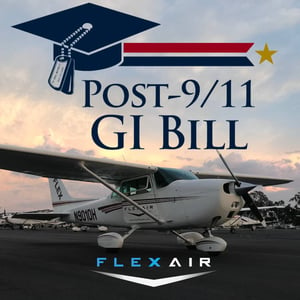 Yes, but only under specific circumstances. The GI Bill pays for flight school subject to the following restrictions: If a veteran has served at least three years on active duty, they have 36 months of Post 9/11 GI Bill entitlement they can use to assist in paying for flight school in only two ways:
Yes, but only under specific circumstances. The GI Bill pays for flight school subject to the following restrictions: If a veteran has served at least three years on active duty, they have 36 months of Post 9/11 GI Bill entitlement they can use to assist in paying for flight school in only two ways:
- By getting advanced flight training including an instrument rating (IR), a multi-engine rating (MEI), a commercial airline pilot certificate or an airline transport certificate (ATP) an FAA approved part 141 vocational flight school like Flex Air, but generally not at a part 61 program.
- By getting a private pilot license as part of an accredited four-year college degree program in aviation.
Both the Post 9/11 GI Bill & Montgomery GI Bill can be used for flight training at Flex Air
What are the differences between the Montgomery GI Bill and the Post 9/11 GI Bill
The Montgomery GI Bill® covers 60% of approved flight training costs but requires veterans to have a private pilot’s license and a valid second-class medical certificate before starting. It typically doesn't cover housing or books.
The Post-9/11 GI Bill®, by contrast, provides more comprehensive coverage, including up to $16,535.46 annually for vocational flight training. It can also cover additional expenses like housing and books, with higher benefits available at public colleges.
The Post-9/11 GI Bill® is generally more favorable for veterans seeking extensive flight training.
Flight Training Benefits Under the Montgomery GI Bill Active Duty (MGIB-AD)
You can be reimbursed for 60% of the approved fees charged by your flight school. Additionally, your MGIB entitlement will be charged at a rate of one (1) month for a specific dollar amount paid, which is subject to change annually.
Flight Training Benefits Under the Montgomery GI Bill Selected Reserve (MGIB-SR)
The VA will pay for 60% of the approved charges for flight training. Every $466 that we pay will be equal to 1 month of MGIB-SR benefits.
Will the GI Bill pay for a Private Pilot License?
No, the first level of certification for pilots, the private pilot license, is not covered by the GI Bill, except when it is part of an accredited 4-year collegiate program for an aviation or aerospace degree. Theoretically, this policy eliminates applicants attempting to get their private pilot certificate for recreational or social reasons when the PPL will be a terminal certification.Options to use the GI Bill to pay for flight training.
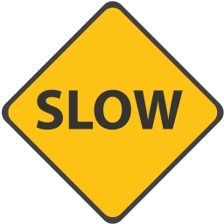 Option 1: Degree Program. Minimum Cost, Slowest Route to Airline Career
Option 1: Degree Program. Minimum Cost, Slowest Route to Airline Career
Enroll in a 4-year college aviation program that includes flight training. Normally the VA doesn't cover the cost of your first step in flight training, a Private Pilot License (PPL). But a 4-year collegiate program can offer PPL to you for free by consuming your entire GI Bill in exchange for 12 months of flight training spread out over four years. You'll receive a tax-free Military Housing Allowance (MHA) from the VA during the school year, but not during your summer breaks. Your GI Bill will not have an annual cap on how much flight training it will cover.
Do not choose Flex Air for this option.
Instead, we recommend you build work experience in a non-aviation job field that will earn supplementary income while you're in college.

Option 2: Vocational Flight School. Maximum Speed, Some Out of Pocket Costs
Enroll in a 2-year associate or non-degree vocational school program, such as San Diego Miramar College, this will be covered by your GI Bill and will activate your housing allowance. Your first step towards becoming an airline pilot will be to a Private Pilot License (PPL). The GI Bill will not cover the private pilot certificate under this scenario. However, if you use both your GI Bill and VR&E benefits, you'll receive a tax-free Military Housing Allowance (MHA) from the VA. Plus you will earn additional income as a flight instructor in your second year of training. Your GI Bill will only cover the first $16,535.46 of costs per academic year in 2025, but smart use of your VR&E benefit will cover the rest.
Use The Fry Scholarship to Pay for Flight School
Use SkillBridge to get paid while you get your PPL
The Flex Air SkillBridge Pilot program is the best first step, if you are eligible. You will need to pay $16,000 - $21,000 for your Private Pilot License (PPL), but all other training can be funded by your VA benefits.
Let us help you use the GI Bill for Flight Training
Be Smart About Using your VA Benefits for Training
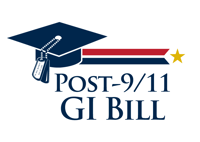 For a typical student, you'll need to plan for two types of out-of-pocket costs. Both can be covered with our SkillBridge Pilot Pathway loan program, which doesn't require any repayments until after you've finished training and landed your first job as a pilot.
For a typical student, you'll need to plan for two types of out-of-pocket costs. Both can be covered with our SkillBridge Pilot Pathway loan program, which doesn't require any repayments until after you've finished training and landed your first job as a pilot.-
Private Pilot License (PPL) costs. The PPL isn't covered by the GI Bill. A PPL costs between $17,000 and $21,000.
-
Yearly Limit costs. As of 2025, the VA only reimburses you for $16,535.46 each academic year at a vocational flight school like Flex Air.
-
Flight School Loans are available. You can take out a Pilot Pathway loan for the entire cost of your training, which doesn't require full payments until two years after SkillBridge, when your progress should make you eligible for an airline pilot job making $95k+ per year.
-
Use VR&E plus your GI Bill. If you qualify for a disability rating of 20% or more, you can use your VR&E benefit for flight training with no annual limits. While you are on VR&E, you'll also receive a tax-free Military Housing Allowance benefit of $1,926 per month at our OJC base (2025 rates) and we may be able to arrange for free on base housing at our MHK base. Make sure you understand how VA Disability can affect FAA Medical Certificates which you'll need to be a commercial pilot.
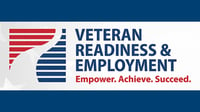 More advice specifically about VR&E for flight training.
More advice specifically about VR&E for flight training.
Flex Air is a Department of Defense SkillBridge flight school
Learn how you can use SkillBridge to unlock your GI Bill and VR&E flight training benefits while still on active duty.
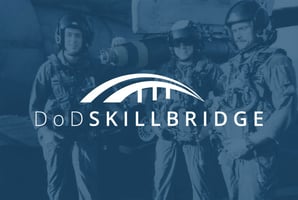 SkillBridge is your first step in flight training. We've designed our SkillBridge program to be a great first step to help you get started. After our San Diego SkillBridge program, you can enroll in the San Diego Miramar College Aviation Operations Program to continue flight training at Flex Air or any flight school in San Diego. In Kansas, you could enroll in the Purdue Global program and we offer guaranteed enrollment into our VA-funded flight training program at the Johnson County Executive Airport south of Kansas City. Or, you can transfer to another GI Bill flight school that we'll help you find based on your preferences. The choice is yours. Learn more about our SkillBridge Aviation program, join a monthly SkillBridge webinar, or watch a recording right of a previous SkillBridge and Veteran Programs webinar right now.
SkillBridge is your first step in flight training. We've designed our SkillBridge program to be a great first step to help you get started. After our San Diego SkillBridge program, you can enroll in the San Diego Miramar College Aviation Operations Program to continue flight training at Flex Air or any flight school in San Diego. In Kansas, you could enroll in the Purdue Global program and we offer guaranteed enrollment into our VA-funded flight training program at the Johnson County Executive Airport south of Kansas City. Or, you can transfer to another GI Bill flight school that we'll help you find based on your preferences. The choice is yours. Learn more about our SkillBridge Aviation program, join a monthly SkillBridge webinar, or watch a recording right of a previous SkillBridge and Veteran Programs webinar right now.Let us help you with Flight Training VA Benefits
How Can I Use the GI Bill® to Pay for Flight Training?
The GI Bill® is a valuable assistance program designed to help veterans pay for flight training at VA-approved flight schools. The education benefits provided by the GI Bill® can help pay for your flight instruction, allowing veterans to pursue a career as a professional pilot or airline pilot. This includes coverage for Part 141 flight schools and various certifications required to become a pilot, such as obtaining a commercial pilot’s license.
Can I Use the GI Bill® to Pay for Flight School?
Yes, you can use your GI Bill® to pay for flight school at a VA-approved institution. The GI Bill® flight training benefits cover tuition, fees, and other approved charges related to your flight training program. This includes programs that help you become a certified flight instructor or obtain advanced certifications, such as the Airline Transport Pilot (ATP) certificate. If you're looking to pursue pilot training, the GI Bill® is one of the best assistance programs available to veterans.
What Flight Training Programs Are Covered Under the GI Bill®?
The GI Bill® covers a range of flight training programs, including those at FAA-certified Part 141 flight schools. Whether you're aiming to become a pilot or an airline pilot, the GI Bill® can be used to pay for training programs that lead to essential certifications, such as a commercial pilot's license or flight instructor certification. Veterans can also use the GI Bill® to pay for pilot training at public colleges offering aviation degrees.
How Do VA Education Benefits Help Pay for Flight Training?
VA education benefits can help pay for flight training by covering a significant portion of the costs associated with flight school. As of the 2025 academic year, the Post-9/11 GI Bill® covers up to $16,535.46 per year for vocational flight training. This can include tuition, flight instruction, and other expenses, making it more affordable for veterans to pursue a career in aviation. If you're using the Montgomery GI Bill®, specific eligibility requirements apply, such as having a private pilot’s license and a valid second-class medical certificate.
What Are the Requirements to Use the GI Bill® for Flight Training?
To use your GI Bill® for flight training, you must meet specific eligibility requirements. For the Montgomery GI Bill®, you need a private pilot’s license and a valid medical certification before beginning your program. Additionally, you must have served on active duty for at least 30 continuous days or be a member of the Selected Reserve. Veterans should also ensure that their flight school is VA-approved to make the best use of their education benefits.
Can I Use the Montgomery GI Bill® for Flight Training?
Yes, you can use the Montgomery GI Bill® for flight training. This program helps pay for your flight instruction at VA-approved flight schools. Veterans must have a private pilot's license and a second-class medical certificate valid for at least the duration of their training. The Montgomery GI Bill® is a great option for veterans looking to use their education benefits to pursue a career in aviation or become a professional pilot.
What Opportunities for Veterans Are Available Through GI Bill® Flight Training?
The GI Bill® provides veterans with numerous opportunities to pursue careers in aviation, including as airline pilots or certified flight instructors. Education benefits can help pay for advanced certifications, such as the ATP, which is required to fly for major airlines. Veterans who use their GI Bill® flight training benefits can expect to pay significantly less for their education, making a career as a professional pilot more accessible.
How Do I Find VA-Approved Flight Schools?
To find the best flight school for your GI Bill® benefits, contact the VA or visit their official website for a list of approved programs. These schools must meet VA and FAA standards to qualify for GI Bill® funding. Whether you are pursuing fixed-wing pilot training or another type of flight instruction, it's essential to verify that your chosen school is approved to ensure your education benefits are applied.
What Expenses Will the GI Bill® Cover for Flight Training?
The GI Bill® covers a variety of expenses related to flight training. These can include tuition, fees, and flight instruction costs at a VA-approved flight school. Veterans may also receive assistance with additional expenses like flight time or simulator fees. As of the 2025 academic year, the Post-9/11 GI Bill® covers up to $16,535.46 for vocational training. Veterans using the Montgomery GI Bill® or Chapter 33 should contact the VA to confirm their specific benefits and approved charges.
Can I Use the GI Bill® for Airline Transport Pilot (ATP) Certification?
Yes, the GI Bill® can be used to pay for ATP certification, which is essential for becoming an airline pilot. The ATP is one of the most advanced certifications in aviation, and VA education benefits can help cover the costs of obtaining it. Veterans pursuing this certification should ensure they are attending a VA-approved flight school and understand the cap on annual benefits, such as the $15,497.15 limit for vocational training.
What Are the Career Opportunities for Veterans Who Complete GI Bill® Flight Training?
Veterans who complete GI Bill® flight training have a wide range of career opportunities available to them. These include becoming a commercial airline pilot, certified flight instructor, or other professional roles in aviation. The education benefits provided by the GI Bill® make it possible for veterans to pursue advanced certifications and gain the flight time needed for these careers. Additionally, veterans with service-connected disabilities may qualify for further assistance without a break in their education.
Key Takeaways:
- The GI Bill® offers education benefits, including flight training, for eligible veterans and service members.
- The VA does cover flight training, but the extent of coverage depends on the type of training and school.
- Both FAA Part 141 certified schools and stand-alone Part 141 pilot schools can be considered.
- The Montgomery GI Bill provides another option for flight training benefits.
- Vocational flight schools are also an option under the GI Bill.
- Always understand the costs and how much the GI Bill will cover before embarking on training.
- Becoming an airline pilot with the help of the GI Bill is a feasible and rewarding journey.
Want to become an Airline Pilot?
GI Bill® is a registered trademark of the U.S. Department of Veterans Affairs (VA). More information about education benefits offered by VA is available at the official U.S. government Web site at www.benefits.va.gov/gibill

